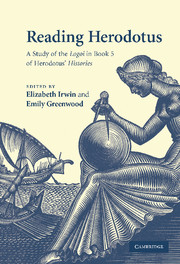Book contents
- Frontmatter
- Contents
- Acknowledgements
- List of contributors
- List of abbreviations
- Introduction: reading Herodotus, reading Book 5
- Chapter 1 ‘What's in a name?’ and exploring the comparable: onomastics, ethnography, and kratos in Thrace, (5.1–2 and 3–10)
- Chapter 2 The Paeonians (5.11–16)
- Chapter 3 Narrating ambiguity: murder and Macedonian allegiance (5.17–22)
- Chapter 4 Bridging the narrative (5.23–7)
- Chapter 5 The trouble with the Ionians: Herodotus and the beginning of the Ionian Revolt (5.28–38.1)
- Chapter 6 The Dorieus episode and the Ionian Revolt (5.42–8)
- Chapter 7 Aristagoras (5.49–55, 97)
- Chapter 8 Structure and significance (5.55–69)
- Chapter 9 Athens and Aegina (5.82–9)
- Chapter 10 ‘Saving’ Greece from the ‘ignominy’ of tyranny? The ‘famous’ and ‘wonderful’ speech of Socles (5.92)
- Chapter 11 Cyprus and Onesilus: an interlude of freedom (5.104, 108–16)
- Chapter 12 ‘The Fourth Dorian Invasion’ and ‘The Ionian Revolt’ (5.76–126)
- Bibliography
- Index locorum
- General index
Introduction: reading Herodotus, reading Book 5
Published online by Cambridge University Press: 22 September 2009
- Frontmatter
- Contents
- Acknowledgements
- List of contributors
- List of abbreviations
- Introduction: reading Herodotus, reading Book 5
- Chapter 1 ‘What's in a name?’ and exploring the comparable: onomastics, ethnography, and kratos in Thrace, (5.1–2 and 3–10)
- Chapter 2 The Paeonians (5.11–16)
- Chapter 3 Narrating ambiguity: murder and Macedonian allegiance (5.17–22)
- Chapter 4 Bridging the narrative (5.23–7)
- Chapter 5 The trouble with the Ionians: Herodotus and the beginning of the Ionian Revolt (5.28–38.1)
- Chapter 6 The Dorieus episode and the Ionian Revolt (5.42–8)
- Chapter 7 Aristagoras (5.49–55, 97)
- Chapter 8 Structure and significance (5.55–69)
- Chapter 9 Athens and Aegina (5.82–9)
- Chapter 10 ‘Saving’ Greece from the ‘ignominy’ of tyranny? The ‘famous’ and ‘wonderful’ speech of Socles (5.92)
- Chapter 11 Cyprus and Onesilus: an interlude of freedom (5.104, 108–16)
- Chapter 12 ‘The Fourth Dorian Invasion’ and ‘The Ionian Revolt’ (5.76–126)
- Bibliography
- Index locorum
- General index
Summary
BACKGROUND
This volume is devoted to the logoi of a single Book of Herodotus' Histories (Book 5). It derives from a Colloquium entitled ‘Reading Herodotus' held at the Faculty of Classics, Cambridge University in July 2002. The rationale behind the Colloquium was to gather together a group of Herodotean readers to explore the texture of individual logoi, their place in the structure of Herodotus’ narrative, and their significance for interpreting the history that he offers us. To this end, each contributor undertook to focus on a logos in Book 5, examining not only its content, but also its logic and language. We hoped that the project of bringing together different readers to address the same book in concert, but with distinctive voices and guided by different logoi, would provide an apt demonstration of just how much may be required to read Herodotus in all his complexity.
When we took the decision to publish the papers that had been presented at the Colloquium, we were keen to preserve the spirit of the conference and the tone of the original papers, which varied in approach and took the kind of interpretative risks that are associated with exploratory reading and debate. We have tried to give the reader a sense of publication as conversation by throwing open our original discussions to a larger audience. To some extent this has already begun to happen in the published volume, as new voices have joined the original discussion and have opened it up in different directions.
- Type
- Chapter
- Information
- Reading HerodotusA Study of the Logoi in Book 5 of Herodotus' Histories, pp. 1 - 40Publisher: Cambridge University PressPrint publication year: 2007
- 9
- Cited by



